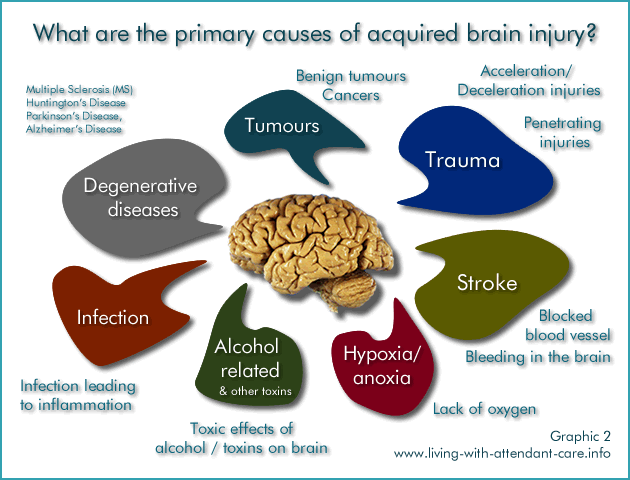- Acquired Brain Injury An introduction for people new to brain injury
- What is acquired brain injury? Understanding the essence of acquired brain injury
- Causes of acquired brain injury The many possible causes of brain injury
- Injury, effects and impacts Injuries to the brain have effects in the brain that lead to impacts in people's lives
- Rehabilitation The rehabilitation process from injury to living in the community
- People with ABI People's experiences of having acquired brain injury
- Attendant care challenges Challenges for people with brain injury getting attendant care
Causes of acquired brain injury

Common causes of ABI are:
Traumatic brain injury
Traumatic brain injury (TBI) occurs as the result of some external force being applied to the brain sufficient to impact on brain functioning, such as a blow to the head or by the head being forced to move rapidly forward or backward. There is usually some loss of consciousness. A TBI might be caused by a motor vehicle accident, fall, assault, sporting accident, gunshot wound or violent shaking. TBIs are also referred to as head injuries, however TBI is more accurate because people can sustain other types of injuries such as cuts or bruising to the face or scalp that are also referred to as head injuries but involve no damage to the brain.
Stroke
Stroke refers to a rapid loss of brain function occurring as the result of a haemorrhage or blockage of the blood vessels that supply blood to the various regions of the brain. Strokes are also referred to as cerebrovascular accidents or disease (CVAs).
Hypoxia/anoxia
Hypoxia/anoxia refers to the reduced or complete stopping of the flow of oxygen to the brain. This can lead rapidly to the death of brain cells in periods as short as 5 minutes. Causes may include drowning, hangings, overdoses or health events such as severe asthma attacks or heart attacks where an individual stops breathing.
Infection
Bacterial or viral infections can lead to an inflammation of the brain covering (meningitis) or the brain tissue (encephalitis). The inflammation leads to a swelling of the brain which can result in the death of nerve cells, or bleeding (haemorrhage) which results in brain damage.
Tumour
Brain tumours affect the brain tissue where they are located, and can damage surrounding brain tissue, structures, and neurological pathways as they grow.
Alcohol and other toxins
Toxins can cause brain damage from an acute exposure, or cause cumulative damage over repeated exposure (e.g., lead or mercury). Alcohol acts as a toxin and the long term misuse of alcohol can cause damage to the brain.
Degenerative neurological diseases
Degenerative neurological conditions cause increasing disruption to neurological function as the disease progresses.
Conditions including:
- Multiple Sclerosis (MS)
- Huntington's disease,
- Parkinson's disease,
- Motor Neurone disease,
- Alzheimer's disease (and other dementias).


